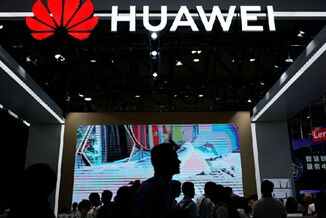华为在全球科技冷战中的新前线:澳大利亚
|
SYDNEY, Australia — Already essentially shut out of the United States, the Chinese technology giant Huawei is scrambling to salvage its reputation in another country where growing worries over spying and security could hurt its chances at a big chunk of business. In an unusual letter to politicians in Australia made public this week, Huawei defended its status as a longtime supplier of networking gear and other equipment to the country’s biggest telecommunications companies. The letter came after news reports that Australian politicians were likely to shut the firm out of a potentially lucrative contract to upgrade the nation’s mobile network over security concerns. It also followed growing concerns among Australian leaders about Chinese influence in the country.
Barring the company from bidding on fifth-generation, or 5G, telecom networks would be “ill informed” and “not based on facts,” Huawei said in its letter. “To completely exclude Huawei from 5G in Australia means excluding Huawei from the entire Australian market,” it said. “We don’t believe this would be in Australia’s best interest.” Huawei fears that the world is embarking on a new cold war, this time over technology. As Australia may show, Huawei could get caught in the middle. More and more, the United States and China are offering differing visions of the future of technology, each powered by their own national champions. Security, data protection and cyberspying are big drivers of both countries’ efforts to help homegrown companies and shut out foreign rivals. That hits at Huawei’s core business: supplying the equipment that powers the wireless age. United States officials have said for years that Huawei products pose unacceptable security risks for Americans, citing the company’s ties to Beijing and its murky ownership. As a result, large American wireless carriers already shun its products, and smaller ones may soon be barred from using the brand under proposed new rules. Separately, Huawei is also under investigation in Washington over whether it violated American trade sanctions against Iran and other countries. Illegal exports of American-sourced technology were the reason for recent, near-fatal penalties meted out by the Trump administration to ZTE, another Chinese telecom equipment maker. Huawei officials have said repeatedly that the company is owned by its employees, not the Communist Party, and that it is a private firm that does not answer to any government. It has said it complies with the laws wherever it operates. Still, Huawei’s big worry is that officials in other countries may someday follow Washington’s lead. Some of America’s closest political and military allies use the company’s technology. Customers in Britain, Canada, Germany and New Zealand are among its biggest. Huawei this week pointed to its business in those countries as proof that it can be a reliable and secure partner. It said it had passed security inspections by officials in Britain, Canada and New Zealand. It offered to build a testing center where Australian officials could monitor the security of its gear. “We have an open invitation for Australian officials and security agencies to meet with our world-leading research and development teams to better understand our technology,” it said. Huawei has long been an important supplier to Australian telecommunications companies, and has a profitable Australian business with revenue in excess of 600 million Australian dollars, or about $445 million, last year, employing more than 700 people. Still, the company appears to be increasingly caught in a debate in Australia about Chinese companies. Last month, Prime Minister Malcolm Turnbull’s government agreed to fund a multimillion-dollar undersea communications cable linking the Solomon Islands with Australia, effectively blocking Huawei’s plan to lay the cables for the island nation. Asked about the lengths Australia went through to stop Huawei building the cable, he said: “Our concern is ensuring that Australian aid provides the support for economic and social development in the Pacific.” More broadly, Australia’s growing economic closeness to China — it is a major supplier of meat, milk, iron ore and other resources to the world’s second-largest economy — has raised concerns among some in the country over Chinese influence in politics and media. That in turn has stirred worries over an anti-China backlash that could hurt the growing numbers of businesspeople, students and others who have become part of Australian society. Since the accusations of political meddling, Australia has taken steps to curb foreign interference, introducing a series of bills aimed at strengthening the country’s espionage laws and criminalizing efforts to interfere in Australian democracy. Australian leaders are trying to walk a fine line so they do not alienate a major customer. Speaking to the Australia China Business Council on Tuesday, Mr. Turnbull said, “The Australia-China relationship gets stronger and stronger.” “It is built on so many connections,” he added. “It is built on great economic engagement, it is built on history, but, above all, it is built on family.” For its 5G build-out, the race is on between telecommunications companies that have been testing the technology for years and are expected to begin bringing the service to consumers next year. Years of exclusion from the United States have not dented Huawei’s determination to help lead wireless internet into its next era. The company has developed 5G-ready products and patented key technologies. It has hired seasoned experts to represent the company at the global body that is setting the new technology’s standards. These complex technical guidelines will ensure that different manufacturers’ gear can be used on different carriers’ mobile networks. “Huawei has a very strong position on shaping 5G standards,” said Dieter Ernst, a senior fellow at the East-West Center, a research and educational organization based in Honolulu. The company can count on support within the information technology, or I.T., business not only within Europe, but also in Canada, Japan and other technologically advanced countries, he said. “Outside the U.S.,” he said, “Huawei has become an accepted member of the international I.T. community.” |









